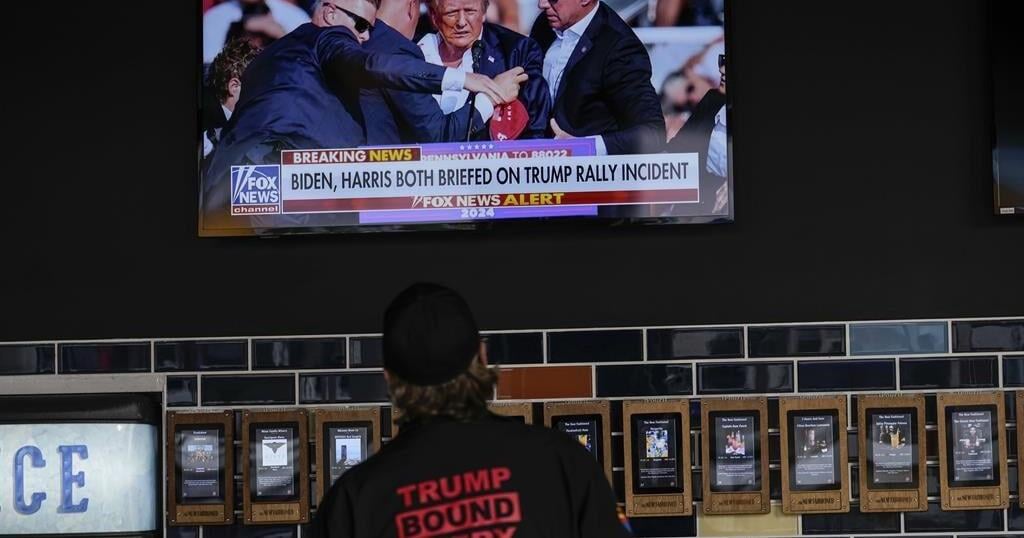OTTAWA – Canadian politicians on opposite ends of the ideological spectrum stressed a need Monday to avoid inflaming discussion to the point of inciting violence against public figures.
An attempted assassination of former U.S. president Donald Trump at a weekend rally in Pennsylvania prompted concern and reflection north of the border, where politicians have seen a steady increase in threatening behaviour.
The shooting in Butler, Pa., left one person dead and two others critically injured. Officials said the gunman was killed by Secret Service personnel.
Trump, who was not seriously injured, is in Milwaukee for the Republican National Convention.
President Joe Biden said Sunday he had ordered an independent security review of the events leading up to the attack on his political rival.
The Prime Minister’s Office said Sunday that Justin Trudeau spoke with Trump, saying there’s no place for political violence and expressing condolences for the victims.
Public Safety Minister Dominic LeBlanc told reporters Monday he had been briefed by the RCMP and Canada’s spy service.
“They went through the threat landscape,” he said. “They talked to me about the additional vigilance that they’ve put in place since the assassination attempt.”
LeBlanc said the government would not discuss specific security measures but said he is “confident that the RCMP will do what’s necessary to protect elected leaders in Canada.”
RCMP spokeswoman Marie-Eve Breton said the force is in regular contact with domestic and international partners regarding protective matters, including the Pennsylvania shooting.
In addition to the prime minister and Governor General, the RCMP is mandated to protect federal ministers and those designated by the public safety minister to receive protection on a case-by-case basis, she noted.
“Protective measures are intelligence-led and based on the latest risk and threat assessments, ongoing security considerations and a number of other factors.”
LeBlanc said he exchanged text messages with Conservative Leader Pierre Poilievre on Sunday to assure him that measures were in place.
In a radio interview Monday with Newstalk 1010, Poilievre said he had requested protection in response to menacing statements.
“Some of them are threats, some of them are implied threats and some of them are vitriol that you can tell lead to violence. And a lot of them have been targeted at my family,” he said.
“There are whack jobs out there that could do something. We take all the precautions possible,” he said, quickly adding: “I have to talk to people, and I’m not going to stop doing that.”
NDP Leader Jagmeet Singh said it is wrong to inflame public debate to the point it ignites harassment or violence.
“I’m worried about the increase of that in the political forum in general. I’m worried about that polarization,” he said Monday in Toronto.
“You should be able to raise concerns, you should be able to say that you don’t agree with a policy and that you’re really upset at it. But it should not be that we treat political opponents as enemies.”
Alberta Premier Danielle Smith said Monday the way in which conservative politicians have been characterized is outrageous, alleging it has led to the current atmosphere in the U.S.
“I certainly hope that progressive politicians here are careful of their language, because they’ve been talking about conservative politicians in the same way and they need to dial it down.”
Finger-pointing, name-calling and violent episodes have made elected officials of all political stripes wary in Canada.
A Manitoba man drove a truck onto the grounds of the Governor General’s official residence in July 2020 and crashed through the gate. He intended to arrest Trudeau to make a statement about the government’s COVID-19 restrictions and its ban on assault-style firearms. He ultimately pleaded guilty to seven weapons-related charges, including possessing guns for a purpose dangerous to the public peace.
A St. Thomas, Ont., man pleaded guilty to common assault for throwing gravel at Trudeau during an election campaign stop in September 2021.
MPs have also been followed on the street and subjected to death threats in recent years.
Ontario Liberal MP Pam Damoff announced she would not run in the next election, saying the threats and misogyny she has experienced made her fearful of going out in public.
The federal Integrated Terrorism Assessment Centre routinely analyzes the threat landscape, including possible dangers to public figures.
RCMP commissioner Mike Duheme said last spring the Mounties were seeing an increase in invective directed at politicians, including comments from the same individuals on multiple occasions.
Duheme said he wanted the government to look at drafting a new law that would make it easier for police to pursue charges against people who threaten elected officials.
However, Justice Minister Arif Virani subsequently suggested existing Criminal Code provisions and police resources were sufficient.
An intelligence report released in March said threats against politicians had become “increasingly normalized” due to extremist narratives prompted by personal grievances and fuelled by misinformation or deliberate lies.
The June 2023 report, prepared by a federal task force that aims to safeguard elections, said baseless theories, disinformation and misinformation had spread to larger audiences, exposing online users to narratives that undermine science, systems of government and traditional figures of authority.
“Violent rhetoric routinely fixates on elected officials — with particular hostility towards high-profile women,” the report said.
LeBlanc said Monday that ensuring the safety of politicians is an important consideration for attracting people to public life.
“If you see discussions about threats of violence, about intimidation, about attacks on social media, it’s going to be harder to get good people to come forward and offer themselves to the service of their communities.”
This report by The Canadian Press was first published July 15, 2024.
— With a file from Sidhartha Banerjee in Montreal
